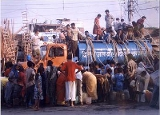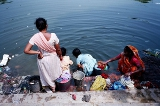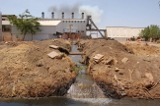Water Resources Institutions and Human Health: Contested Institutional Terrain of Water-and Vector-borne Diseases in Ahmedabad City, India
- Keywords
-
IWRM, institutional analysis, water-related diseases, urbanisation
- Countries
-
India
- Summary
-
The research examines the role of urbanization on water management and its association to risk to human health (namely water- and vector-borne diseases) in Ahmedabad city. The research's overall objectives are:
- To spatially analyse the distribution of water- and vector-borne diseases in Ahmedabad city (64 administrative wards spread out in 6 administrative zones).
- To assess the socio-economic, institutional and ecological burden on water-related diseases at the household level in two selected wards in the city.
- To take systems perspective to understand the spatial and temporal factors influencing water- and vector-borne diseases among deprived population (women/children) in the two wards in the city.
Though science has contributed significantly in addressing the threat from water- and vector-borne diseases, solutions to these complex problems are still sought in a simple, one-dimensional ‘cause-effect remedy’ context with techno-centric and socially engineered solutions (Saravanan, Mollinga and Bogardi, 2011).
Such conceptualization fails to consider the complex interaction between the social and bio-physical systems that shape urban forms of water management. The research takes a systems perspective to understand the political form of contestation among various institutions in influencing the urban water infrastructure, socio-economic, hygiene, nutritional and human mobility factors leading to spread of water- and vector-borne disease in the city.
The research applies multiple research methods from both qualitative and quantitative information at different levels (city, households and individuals) and problem-oriented approach to understand the role of contentious institutional terrain in influencing urban health.
By bringing together the concepts and theories of urban political ecology, new institutionalism, and socio-epidemiology, the research aims to contribute to the growing debate on the importance of research to combine the strength of ‘objectivity –subjectivity’ in urban health.
- Main Funding Partners
-
The German Research Council (DFG)
- Further information
-
Workshop on "Are we getting crowded, thirsty and sick? Urbanization, water management and human health"
24 January 2013, Hotel Cambay Grand, Near PERD Centre, Sola Over Bridge, Thaltej, Ahmedabad - 380 054, Gujarat
<link http: www.zef.de fileadmin webfiles downloads projects health zef-iiphg-workshop-finalannouncementjan2013.pdf _blank external-link-new-window external link in new>» Announcement
<link http: www.zef.de fileadmin webfiles downloads projects health zef-iiphg-workshop-jan2013-finalprogram.pdf _blank external-link-new-window external link in new>» Program - Publications
-
Saravanan.V.S, M.A. Idenal, S. Saiyed, D. Saxena and S. Gerke. 2016. Urbanization and human health in urban India: institutional analysis of water-borne diseases in Ahmedabad. Health Policy and Planning, doi: 010.1093/heapol/czw039: 1-11.
<link https: academic.oup.com heapol article-abstract urbanization-and-human-health-in-urban-india _blank external-link-new-window external link in new>» moreSaravanan.V.S., D. Mavalankar, S.P. Kulkarni, S. Nussbaum, and M. Weigelt. 2015. Metabolized-Water Breeding Diseases in Urban India - Sociospatiality of Water Problems and Health Burden in Ahmedabad City. Journal of Industrial Ecology, 19: 93-103.
<link http: onlinelibrary.wiley.com doi jiec.12172 abstract _blank external-link-new-window external link in new>» moreSaravanan.V.S. 2014. How rotting water infrastructure pipes breed diseases in our cities. Governance Now: Of Policies and Politics, 16-31 August 2014.
<link http: www.governancenow.com _blank external-link-new-window external link in new>» moreSaravanan.V.S. 2014. Sustainable or 'sustaining' development goals: The role of international agencies. Governance Now: Of Policies and Politics, 5(18): 48-50.
<link http: www.zef.de http www.governancenow.com _blank external-link-new-window>» moreSaravanan.V.S. and D. Gondhalekar. 2014. Can water supply and sanitation be a 'preventive medicine'?, Water International Policy Briefing. March 2014.
<link http: www.zef.de uploads tx_zefportal publications _blank external-link-new-window external link in new>» Download [PDF | 780.52KB]Guest Editor. 2013. Special Issue on Water supply, sanitation and hygiene as ‘preventive medicine’: Challenges in rapidly growing economies. Water International, 38 (7). 867-874.
<link http: www.zef.de fileadmin webfiles downloads projects health editorial_corringendum.pdf _blank>» moreSaravanan.V.S. 2013. Urbanizing diseases; Contested institutional terrain of water- and vector borne diseases in Ahmedabad city, India. Water International, 38 (7), 875-887.
<link http: www.zef.de fileadmin webfiles downloads projects health saravanan_2013_urbanizing_diseases.pdf _blank>» moreGondhalekar, D., Mollinga, PP and Saravanan.V.S. 2013. Towards a systematic comparative water and health research. Water International, 38 (7), 967-976.
<link http: www.zef.de fileadmin webfiles downloads projects health gondhalekar_et-al_2013.pdf _blank>» moreSaravanan.V.S. 2013. Blame it on the community, immunize the state and international agencies: Assessment of water supply and sanitation program in India. ZEF Working Paper 124
<link http: www.zef.de fileadmin webfiles downloads zef_wp wp124.pdf _blank>» more - Duration of the Project
-
May 2011 to April 2014





